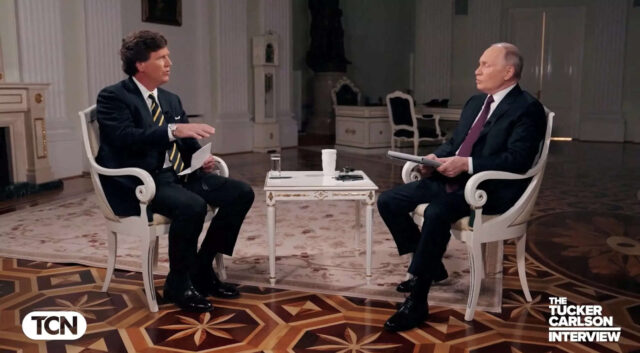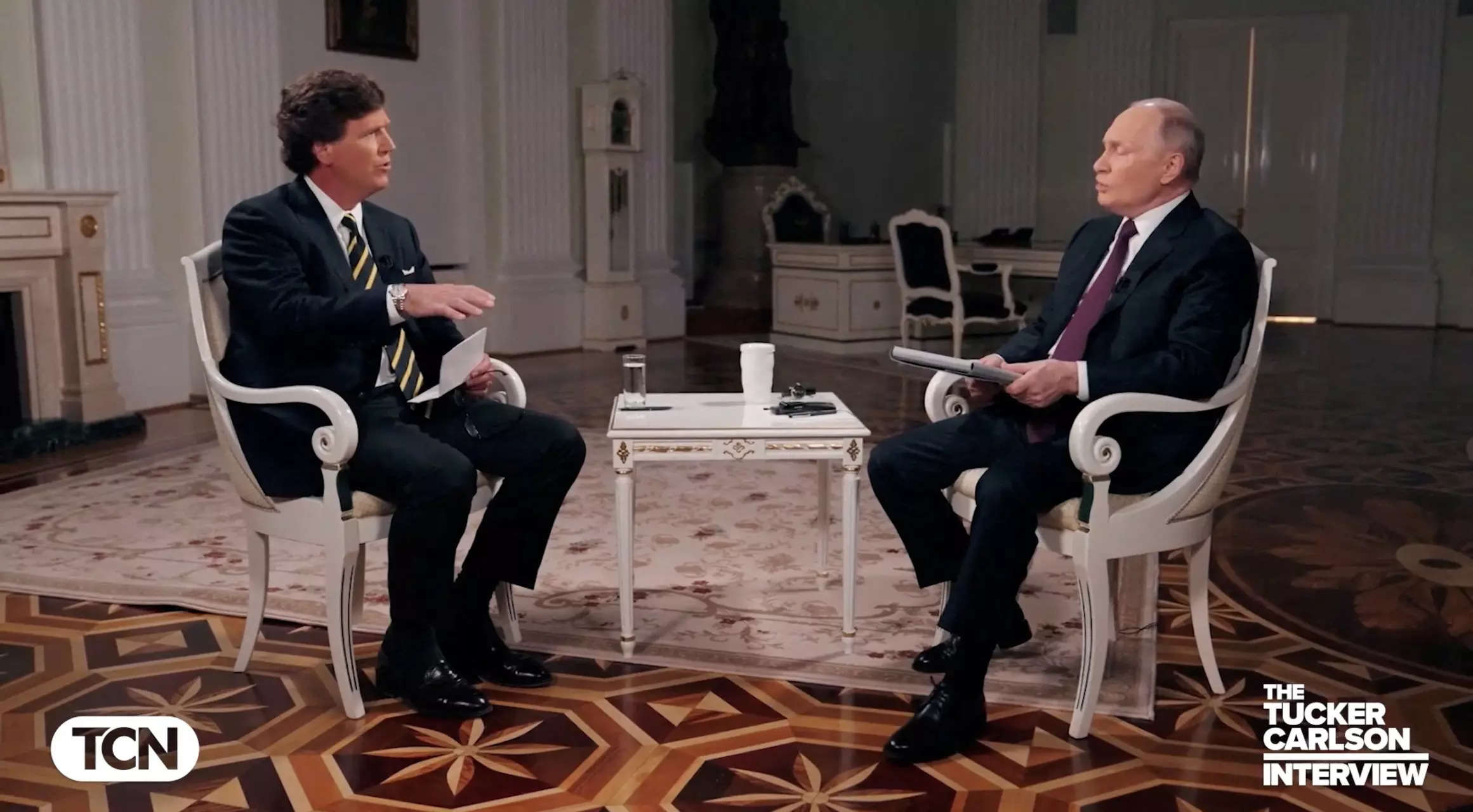
In a significant interview that aired on Thursday, Russian President Vladimir Putin, speaking with Tucker Carlson, a controversial right-wing American journalist, made clear Russia‘s stance on the ongoing conflict in Ukraine and its broader international relations. The interview, Putin’s first with an American journalist since the onset of the Ukraine invasion nearly two years ago, lasted over two hours and provided a platform for Putin to articulate Russia’s interests and intentions, particularly regarding its neighbors and the West’s perception of the conflict.
Putin emphasized that Russia is not seeking to expand its military actions beyond Ukraine, specifically mentioning Poland and Latvia as countries where Russia has “no interest.” He said, “Only in one case, if Poland attacks Russia,” would he consider sending Russian troops to a Nato member state, underlining a defensive posture rather than an aggressive expansionist policy. This comment was part of a broader discussion that also touched on Russia’s relations with Ukraine, Poland, and other countries, indicating a nuanced approach to international relations amidst the ongoing conflict.
The interview was conducted in Moscow and aired on Tucker Carlson’s website, showcasing a dialogue that diverged from mainstream Western media’s portrayal of the Ukraine conflict. The Kremlin suggested Putin agreed to the interview with Carlson due to the journalist’s unique approach, contrasting with what it views as “one-sided” reporting by many Western news outlets. Carlson, known for his close connections to former US President Donald Trump, has been a vocal critic of the Biden administration’s support for Ukraine, highlighting the billions of dollars in aid sent to the country and questioning the narrative presented by much of the Western media.
During the interview, Putin also addressed the situation of imprisoned Wall Street Journal reporter Evan Gershkovich, suggesting that a deal for his release could be possible through negotiations via “special services channels,” while maintaining the accusation that Gershkovich is a spy, a claim both the Journal and the US government deny.
Putin’s remarks extended beyond the immediate conflict in Ukraine, touching on broader themes of Russian history, perceived Western betrayals, and the impossibility of defeating Russia in Ukraine. He criticized the US and Nato’s support for Ukraine, suggesting that the West is gradually realizing the futility of seeking a strategic defeat of Russia. Furthermore, Putin directly addressed the US Congress, hinting at a path to de-escalation by ceasing the supply of weapons to Ukraine.
The Russian President also commented on the upcoming US presidential election, suggesting that a change in leadership would unlikely alter the dynamics of the conflict or US-Russia relations significantly. He noted, “It is not about the leader. It is not about the personality of a particular person,” indicating a perception of systemic rather than personal factors driving the confrontation between Russia and the West.
Carlson’s interview with Putin, while offering a platform for the Russian leader’s views, has been noted for its lack of challenging questions, particularly regarding Putin’s relationship with Trump and the broader implications of Russia’s actions in Ukraine. This conversation occurs against the backdrop of Biden’s strong support for Ukraine and his labeling of Putin as a “war criminal,” contrasting sharply with Trump’s praise for Putin and claims of being able to resolve the conflict swiftly if reelected.
(With inputs from agencies)
Putin emphasized that Russia is not seeking to expand its military actions beyond Ukraine, specifically mentioning Poland and Latvia as countries where Russia has “no interest.” He said, “Only in one case, if Poland attacks Russia,” would he consider sending Russian troops to a Nato member state, underlining a defensive posture rather than an aggressive expansionist policy. This comment was part of a broader discussion that also touched on Russia’s relations with Ukraine, Poland, and other countries, indicating a nuanced approach to international relations amidst the ongoing conflict.
The interview was conducted in Moscow and aired on Tucker Carlson’s website, showcasing a dialogue that diverged from mainstream Western media’s portrayal of the Ukraine conflict. The Kremlin suggested Putin agreed to the interview with Carlson due to the journalist’s unique approach, contrasting with what it views as “one-sided” reporting by many Western news outlets. Carlson, known for his close connections to former US President Donald Trump, has been a vocal critic of the Biden administration’s support for Ukraine, highlighting the billions of dollars in aid sent to the country and questioning the narrative presented by much of the Western media.
During the interview, Putin also addressed the situation of imprisoned Wall Street Journal reporter Evan Gershkovich, suggesting that a deal for his release could be possible through negotiations via “special services channels,” while maintaining the accusation that Gershkovich is a spy, a claim both the Journal and the US government deny.
Putin’s remarks extended beyond the immediate conflict in Ukraine, touching on broader themes of Russian history, perceived Western betrayals, and the impossibility of defeating Russia in Ukraine. He criticized the US and Nato’s support for Ukraine, suggesting that the West is gradually realizing the futility of seeking a strategic defeat of Russia. Furthermore, Putin directly addressed the US Congress, hinting at a path to de-escalation by ceasing the supply of weapons to Ukraine.
The Russian President also commented on the upcoming US presidential election, suggesting that a change in leadership would unlikely alter the dynamics of the conflict or US-Russia relations significantly. He noted, “It is not about the leader. It is not about the personality of a particular person,” indicating a perception of systemic rather than personal factors driving the confrontation between Russia and the West.
Carlson’s interview with Putin, while offering a platform for the Russian leader’s views, has been noted for its lack of challenging questions, particularly regarding Putin’s relationship with Trump and the broader implications of Russia’s actions in Ukraine. This conversation occurs against the backdrop of Biden’s strong support for Ukraine and his labeling of Putin as a “war criminal,” contrasting sharply with Trump’s praise for Putin and claims of being able to resolve the conflict swiftly if reelected.
(With inputs from agencies)






































